Taiwan’s battle against COVID-19 disinformation
Disinfo about the government’s handling of
Taiwan’s battle against COVID-19 disinformation
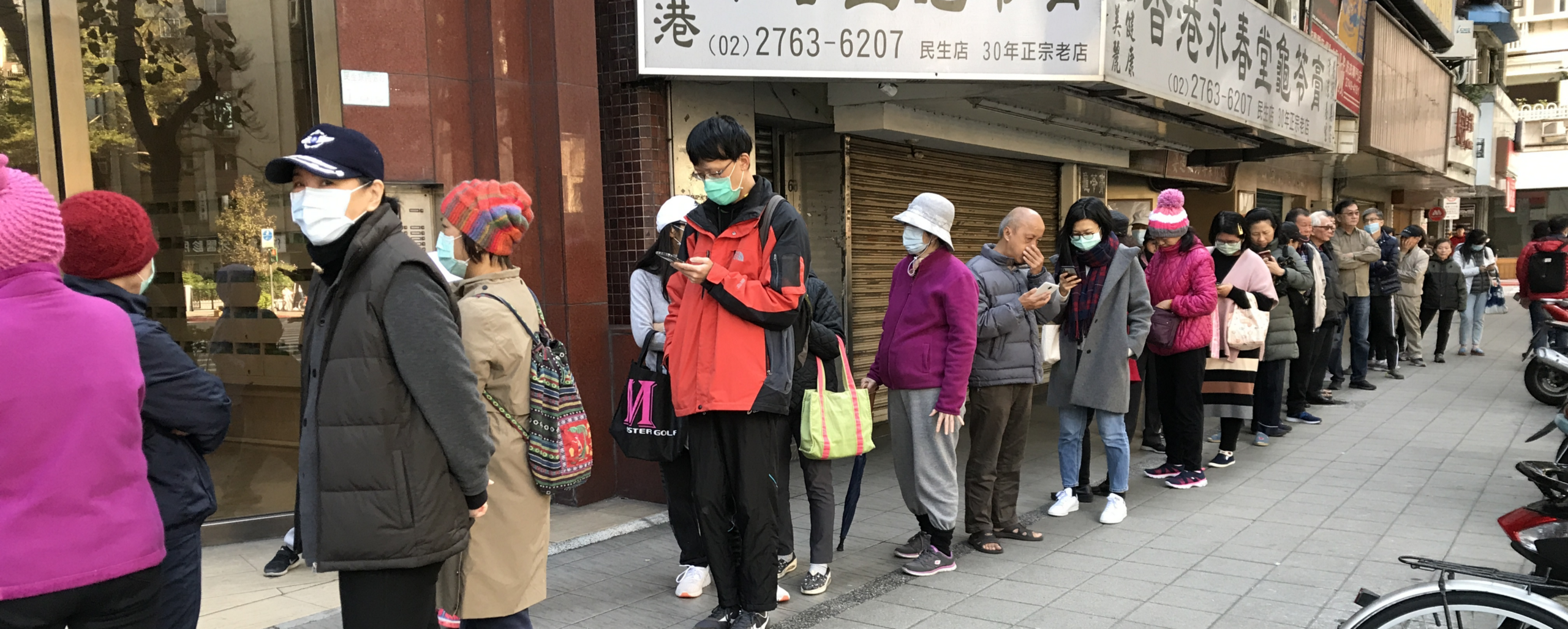
Disinfo about the government’s handling of the outbreak risks derailing the public health response
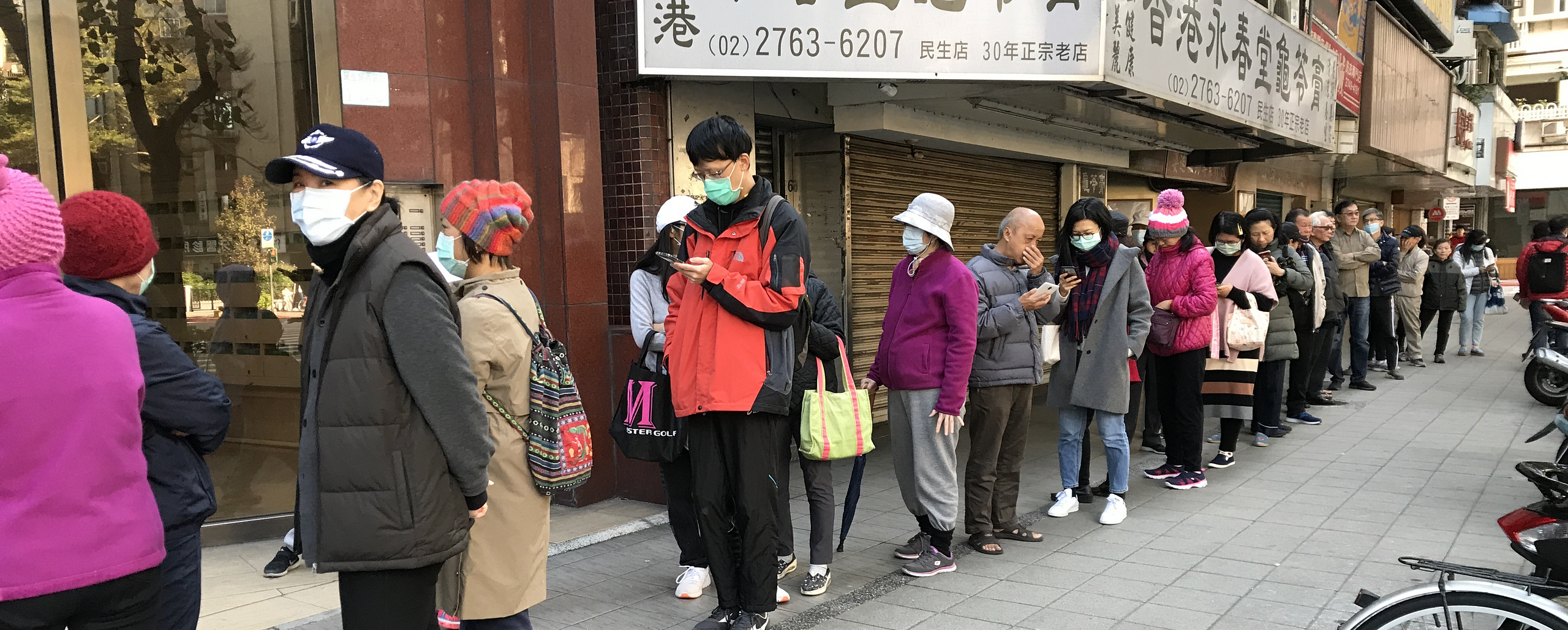
As part of our effort to broaden expertise and understanding of information ecosystems around the world, the DFRLab is publishing this external contribution. The views and assessments in this analysis do not necessarily represent those of the DFRLab.
Since COVID-19 broke out in Taiwan in late January, a surge of disinformation has emerged surrounding the current status of the outbreak and the government’s management of it. Social media posts and messages have spread claims that the Taiwanese government is covering up the number of coronavirus infections in the country. The number of purported cases in these posts range from a daily increase of a couple of hundred to several thousand. According to latest statistics from Taiwan’s Centers for Disease Control (CDC), as of June 22, 2020, there have been 446 confirmed infections and seven deaths.
Main disinformation narratives circulating in Taiwan
Disinformation in Taiwan regarding the coronavirus outbreak has typically targeted the government’s handling of it, alleging that the coronavirus is out of control in the country or that public health officials are concealing the number of cases.
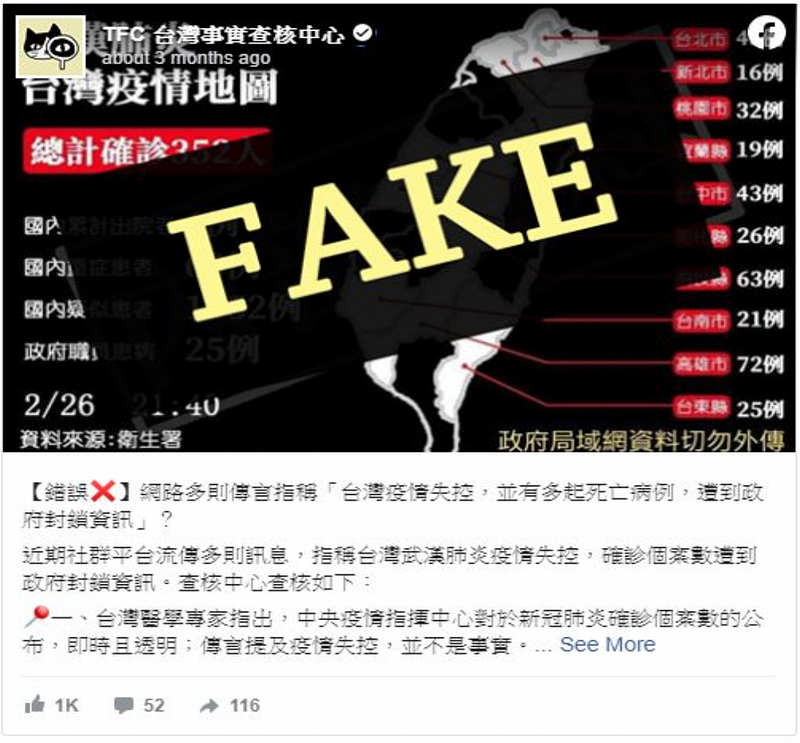
Other posts have claimed that countless bodies have been buried inside the Taipei Dome stadium, or that the government had cremated the corpses of infected citizens in different areas of Taiwan to avoid the high number of COVID-related causalities being reported. Another post showed an image of a city in flames along with text saying the virus has gone beyond control in the southern city of Tainan. The Taiwan FactCheck Center, a local non-profit fact-checking organization, later demonstrated that the image of the burning city was a still from the 2016 South Korean zombie thriller “Train to Busan.” The fact-checking organization also debunked all of the above examples.
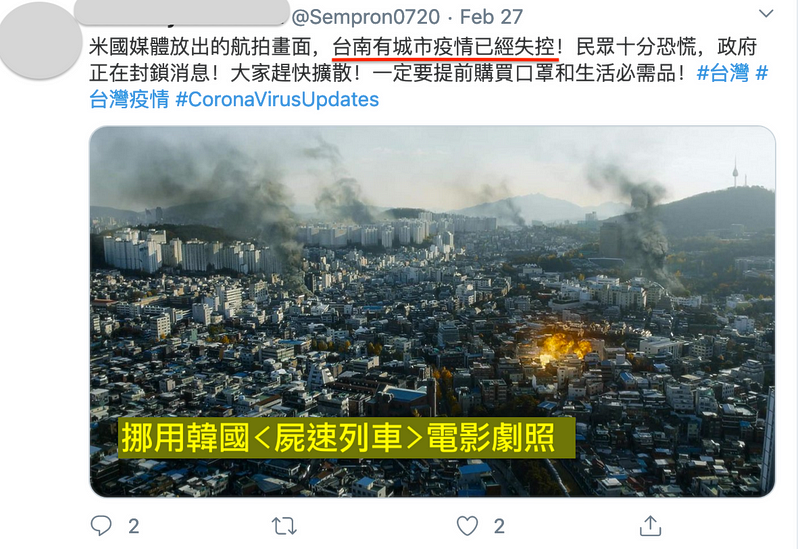

Taiwanese authorities step in
While Taiwan is not a rookie in combating different forms of disinformation, the severity of COVID-related disinformation has prompted the Ministry of Justice Investigation Bureau (MJIB) to publicly address the matter.
In a Feb. 29 press release, the MJIB stated that an investigation had determined that most of the COVID-19 disinformation relating to Taiwan originating from social media platforms in China — mainly on Weibo and Di Bar — which was then reposted to Facebook pages through fake accounts. The bureau said the surge in disinformation appeared to stem from resentment toward Taiwan for its ban on the export of facial masks. The MJIB added that Chinese Internet users have been editing images of official notices issued by the Taiwanese government and inserting disinformation. These, it said, constitute attempts to discredit government notices and undermine their reliability.
According to Taiwan’s Special Act on COVID-19 Prevention, Relief, and Restoration passed on Feb. 25, one of a number of laws passed around the world to combat coronavirus disinformation, individuals who spread rumors or disinformation about COVID-19 that risk harming the public interest can face a maximum prison term of three years and a possible fine of NT$3 million (US$99,000). A man from New Taipei City was arrested on Feb. 29 for posting a false claim on Facebook saying that COVID-19 was out of control in Taiwan, that the military had assumed control over Taipei, and that the Tsai administration had been burning corpses of infected patients in the streets.
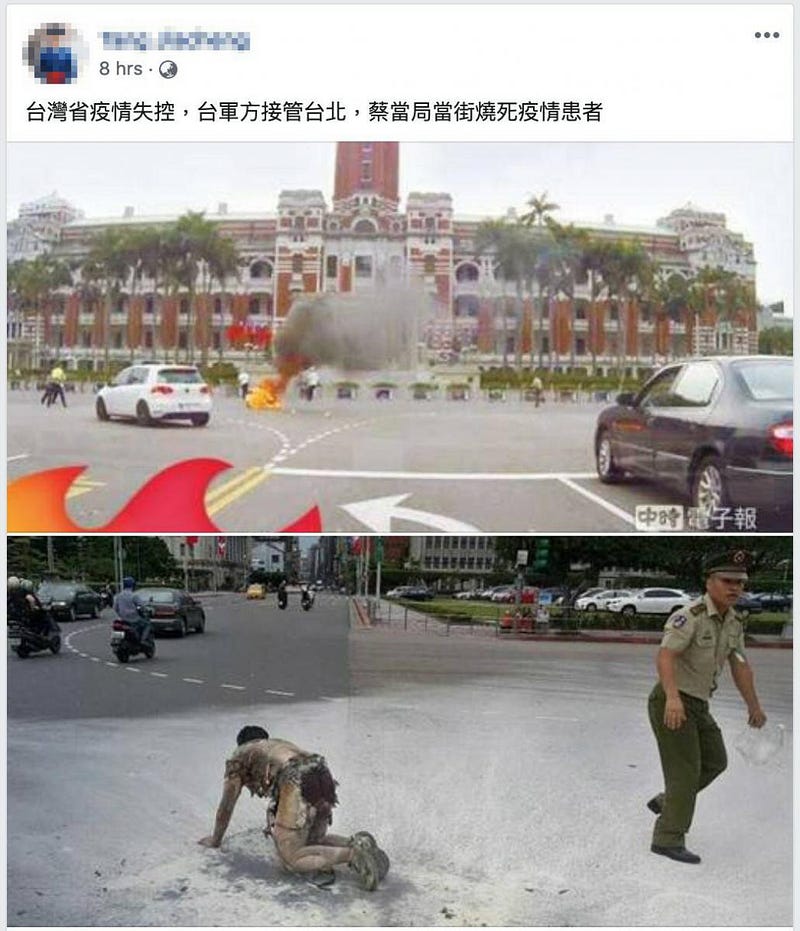
Local authorities and NGOs are also putting in efforts to ensure that correct information is being circulated among the Taiwanese public. The Central Epidemic Command Center (CECC) has held at least one press briefing nearly every day to keep the public informed on the current developments of COVID-19 in Taiwan. Over 100 digital maps have been created to provide real-time information on the pharmacies that carry facial masks and the number of masks left in stock. Taiwan’s Minister without Portfolio Audrey Tang has also worked with civic organizations and the National Health Insurance Administration to compile all the digital maps on one website for users to choose from.
Another counter-disinformation strategy the Taiwan government has implemented is “humor over rumor,” as Minister Tang has coined in interviews and presentations.
An example that Minister Tang often gives is the panic-buying of tissue paper in early February. This was due to disinformation about tissue paper and medical masks being made from the same raw material, and the high demand in medial masks affecting the produce of tissue paper. In response, Taiwan Premier Su Tseng-Chang posted a meme on social media of himself wiggling his buttocks and the text, “We only have one pair of buttocks,” hinting that the tissue paper panic was unnecessary. The image also included a chart showing the raw materials of tissue paper and medical masks were different and imported from different countries. The panic died down in the next few days, and the source of the disinformation was later found to be a tissue paper reseller.

But the disinformation epidemic surrounding the COVID-19 outbreak is far from over, according to the MJIB and academics. The MJIB warned in its Feb. 29 press release that Chinese Internet users are starting to discuss how the different terminology and characters used in Taiwan and China has made the disinformation easier to identify. There have also been suggestions of using the language adopted in Taiwan FactCheck Center reports to smooth over the language differences, the MJIB said.
Puma Shen, an assistant professor at the National Taipei University’s Graduate School of Criminology and one of the top researchers on disinformation in Taiwan, told media on March 4 that the previous wave of disinformation was merely Chinese Internet users “testing the water.” In his assessment, there will be a larger disinformation attack on Taiwan once more infected COVID-19 cases are confirmed in the country.
According to Shen, the target audience of such disinformation includes not only the Taiwan public, but also Chinese Internet users who manage to get around China’s “Great Firewall” for information. This, he argues, is to create a façade that Taiwanese media reports are disinformation, and in turn to reinforce stability within China.
Since Shen’s analysis and MJIB’s press releases, pieces of disinformation have been circulating under the false appearance of government notices. In early March, a message claiming to be issued by the Taiwan Water Corporation — Taiwan’s state-owned water utility service company — was spread through messaging apps. The message was “a reminder” in simplified Chinese cautioning extra chlorine had been added to the water treatment process, and people should let the water sit for over two hours before usage.
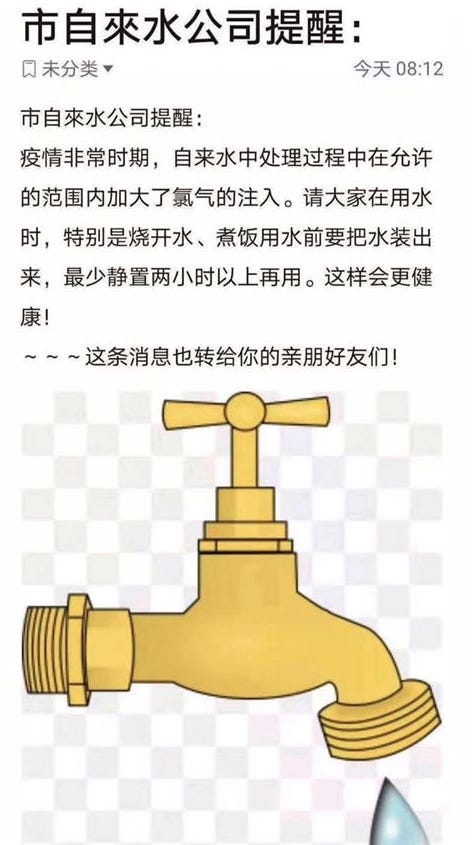
Another piece of disinformation was sent as an email in early May from Taiwan’s CDC, saying that a COVID-19 patient had identified the email recipient as someone she had been in physical contact with in the past 14 days. The email, also in the simplified Chinese used in mainland China, was a “final notice” for the recipient to get tested for COVID-19 and was signed off by CDC Director-General Chou Jih-haw. The Taiwan FactCheck Center debunked both pieces of disinformation.

As COVID-19 disinformation targeting Taiwan continues to churn out of China, the disinformation messages seem to have a common aim of sowing doubt over the current government’s management of the epidemic, which further leads to undermining the credibility of the island nation’s democratic institutions and system. Another intimidating phenomenon worth noting is the gradual sophistication of doctored government notices and reports that may pose an even larger threat to the Taiwanese society.
To ramp up government efforts in combating disinformation, the MJIB’s temporary disinformation unit created last August was upgraded to the Cyber Security Investigation Office on April 24. “Whether it is fabricated statements attributed to the head of the CECC, rumors of tissue paper shortage, or online disinformation produced by external forces — all of it interferes with our efforts to contain the epidemic,” President Tsai Ing-Wen said at the office’s inauguration.
“We have also seen disinformation designed to sow division in domestic and foreign elections, which can go so far as to threaten the stability of our democratic system,” she continued. “This is nontraditional information warfare. The government must confront it with gravity and force.”
Olivia Yang is a Program Officer at the Taiwan Foundation for Democracy.
Follow along for more in-depth analysis from our #DigitalSherlocks.

